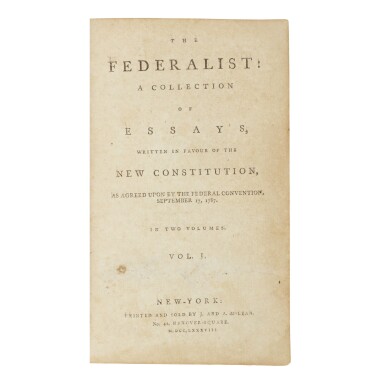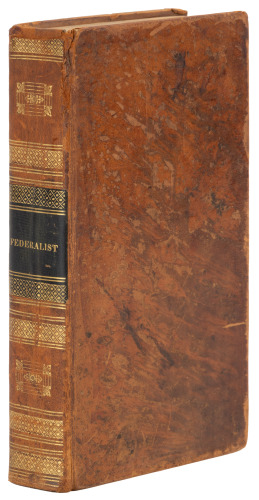(Hamilton, Alexander, James Madison, and John Jay)The Federalist: A Collection of Essays, Written in Favour of the New Constitution, as Agreed upon by the Federal Convention, September 17, 1787. New York: Printed and sold by Jstieohn and Andrew M'Lean, 1788
2 vols., 12mo (vol. I: 175 x 110 mm; vol. II: 186 x 110 mm, uncut). An unidentified early reader has added a few brief annotations or text corrections. Lightly browned, occasional foxing; vol. I with paper flaw at inner margin of e4, repaired tear at I1, pinhole to L2; vol. II with repaired tears to M2 & M3. Publisher's blue-gray boards backed with drab paper spines, spines stenciled with Arabic numerals (title-pages have Roman); rubbed and lightly stained, spines rather worn with some loss, especially vol. II. Green morocco solander box, chemises.
A first edition of The Federalist—a "classic exposition of the principles of republican government" (Bernstein)—in the original boards and in essentially "as issued" condition: uncut, unpressed, and unsophisticated.
Copies of The Federalist uncut and in original boards are very rare and highly coveted. Since 1971 just five other sets in original boards are cited as sold in Rare Book Hub. So fresh and unpressed is the present copy that when it was offered as one of the "Selections from the Davidson Collection" at Christie's in 2015 it was understandably, albeit erroneously, described as printed on thick paper.
Written as expedient political propaganda for the purpose of supporting New York's ratification of the Federal Constitution, the essays in The Federalist are now recognized as one of America's most important contributions to political theory. Alexander Hamilton was the principal force behind the entry of "Publius" (the pen name shared by all three authors) into the ratification pamphlet wars, but he enlisted Virginian James Madison and fellow New Yorker John Jay as collaborators. Each was assigned an area corresponding to his expertise. Jay naturally assumed responsibility for foreign relations. Madison, knowledgeable in the history of republics and confederacies, wrote on those topics. Having drafted the Virginia Plan, it also fell to him to outline the structure of the new government. Hamilton took on those branches of government most congenial to him: the executive and the judiciary; and he also covered military matters and taxation.
At the time of the writing of the essays, Hamilton and Madison "were so close in style and outlook that scholars find it hard to sort out their separate contributions" (Chernow, Alexander Hamilton, p. 251). The Library of Congress attributes with certainty fifty-one essays to Hamilton, fifteen to Madison, and five to Jay, three to Hamilton and Madison together, and nine as being written by either Hamilton or Madison. The first thirty-six Federalist papers were collected and published by the M'Lean brothers in March 1788, and the final forty-nine—together with the text of the Constitution, a roster of its signers, and the resolution submitting it to the consideration of Congress—followed in a second volume two months later. In fact, the final eight essays were printed in book form before they appeared serially in newspapers.
George Washington, who would shortly chair the Constitutional Convention, praised the collection of essays in a letter to Hamilton, 28 August 1788: "As the perusal of the political papers under the signature of Publius has afforded me great satisfaction, I shall certainly consider them as claiming a most distinguished place in my library. I have read every performance which has been printed on one side and the other of the great question lately agitated (so far as I have been able to obtain them) and, without an unmeaning compliment, I will say that I have seen no other so well calculated (in my judgment) to produce conviction on an unbiassed mind, as the Production of your Triumvirate. When the transient circumstances & fugitive performances which attended this crisis shall have disappeared, that work will merit the notice of Posterity; because in it are candidly discussed the principles of freedom & the topics of government, which will be always interesting to mankind so long as they shall be connected in Civil Society" (Papers, Confederation Series, ed. Abbot, 6:480–482).
In 1825 Thomas Jefferson urged the adoption of The Federalist as a required text at the University of Virginia, describing it as "an authority to which appeal is habitually made by all … as evidence of the general opinion of those who framed, and of those who accepted the Constitution of the United States, on questions as to its genuine meaning." The significance of the work remains unchallenged: constitutional scholar Michael I. Meyerson wrote in his study that "The Federalist not only serves as the single most important resource for interpreting the constitution, it provides a wise and sophisticated explanation of the uses and abuses of governmental power from Washington to Baghdad" (Liberty's Blueprint: How Madison and Hamilton Wrote the Federalist Papers, Defined the Constitution, and Made Democracy Safe for the World, 2008, p. ix).
The Federalist is without question the most important commentary on the Constitution, the most significant American contribution to political theory, and among the most important of all American books.
REFERENCE:Bernstein, Are We To Be a Nation?, pp. 239–242; Church 1230; ESTC W5416; Evans 21127; Federal Hundred 19; Ford, Bibliotheca Hamiltoniana 17; Grolier, American 19; Printing and the Mind of Man 234; Sabin 23979; Streeter 2:1049
PROVENANCE:Alfred M. Kahn (bookplate; Christie’s, 11 April 1980, lot 153) — Louis and Anne Marie Davidson (bookplate) — John Davidson (bookplate; Christie’s New York, 8 December 2015, lot 243)
(Hamilton, Alexander, James Madison, and John Jay)The Federalist: A Collection of Essays, Written in Favour of the New Constitution, as Agreed upon by the Federal Convention, September 17, 1787. New York: Printed and sold by Jstieohn and Andrew M'Lean, 1788
2 vols., 12mo (vol. I: 175 x 110 mm; vol. II: 186 x 110 mm, uncut). An unidentified early reader has added a few brief annotations or text corrections. Lightly browned, occasional foxing; vol. I with paper flaw at inner margin of e4, repaired tear at I1, pinhole to L2; vol. II with repaired tears to M2 & M3. Publisher's blue-gray boards backed with drab paper spines, spines stenciled with Arabic numerals (title-pages have Roman); rubbed and lightly stained, spines rather worn with some loss, especially vol. II. Green morocco solander box, chemises.
A first edition of The Federalist—a "classic exposition of the principles of republican government" (Bernstein)—in the original boards and in essentially "as issued" condition: uncut, unpressed, and unsophisticated.
Copies of The Federalist uncut and in original boards are very rare and highly coveted. Since 1971 just five other sets in original boards are cited as sold in Rare Book Hub. So fresh and unpressed is the present copy that when it was offered as one of the "Selections from the Davidson Collection" at Christie's in 2015 it was understandably, albeit erroneously, described as printed on thick paper.
Written as expedient political propaganda for the purpose of supporting New York's ratification of the Federal Constitution, the essays in The Federalist are now recognized as one of America's most important contributions to political theory. Alexander Hamilton was the principal force behind the entry of "Publius" (the pen name shared by all three authors) into the ratification pamphlet wars, but he enlisted Virginian James Madison and fellow New Yorker John Jay as collaborators. Each was assigned an area corresponding to his expertise. Jay naturally assumed responsibility for foreign relations. Madison, knowledgeable in the history of republics and confederacies, wrote on those topics. Having drafted the Virginia Plan, it also fell to him to outline the structure of the new government. Hamilton took on those branches of government most congenial to him: the executive and the judiciary; and he also covered military matters and taxation.
At the time of the writing of the essays, Hamilton and Madison "were so close in style and outlook that scholars find it hard to sort out their separate contributions" (Chernow, Alexander Hamilton, p. 251). The Library of Congress attributes with certainty fifty-one essays to Hamilton, fifteen to Madison, and five to Jay, three to Hamilton and Madison together, and nine as being written by either Hamilton or Madison. The first thirty-six Federalist papers were collected and published by the M'Lean brothers in March 1788, and the final forty-nine—together with the text of the Constitution, a roster of its signers, and the resolution submitting it to the consideration of Congress—followed in a second volume two months later. In fact, the final eight essays were printed in book form before they appeared serially in newspapers.
George Washington, who would shortly chair the Constitutional Convention, praised the collection of essays in a letter to Hamilton, 28 August 1788: "As the perusal of the political papers under the signature of Publius has afforded me great satisfaction, I shall certainly consider them as claiming a most distinguished place in my library. I have read every performance which has been printed on one side and the other of the great question lately agitated (so far as I have been able to obtain them) and, without an unmeaning compliment, I will say that I have seen no other so well calculated (in my judgment) to produce conviction on an unbiassed mind, as the Production of your Triumvirate. When the transient circumstances & fugitive performances which attended this crisis shall have disappeared, that work will merit the notice of Posterity; because in it are candidly discussed the principles of freedom & the topics of government, which will be always interesting to mankind so long as they shall be connected in Civil Society" (Papers, Confederation Series, ed. Abbot, 6:480–482).
In 1825 Thomas Jefferson urged the adoption of The Federalist as a required text at the University of Virginia, describing it as "an authority to which appeal is habitually made by all … as evidence of the general opinion of those who framed, and of those who accepted the Constitution of the United States, on questions as to its genuine meaning." The significance of the work remains unchallenged: constitutional scholar Michael I. Meyerson wrote in his study that "The Federalist not only serves as the single most important resource for interpreting the constitution, it provides a wise and sophisticated explanation of the uses and abuses of governmental power from Washington to Baghdad" (Liberty's Blueprint: How Madison and Hamilton Wrote the Federalist Papers, Defined the Constitution, and Made Democracy Safe for the World, 2008, p. ix).
The Federalist is without question the most important commentary on the Constitution, the most significant American contribution to political theory, and among the most important of all American books.
REFERENCE:Bernstein, Are We To Be a Nation?, pp. 239–242; Church 1230; ESTC W5416; Evans 21127; Federal Hundred 19; Ford, Bibliotheca Hamiltoniana 17; Grolier, American 19; Printing and the Mind of Man 234; Sabin 23979; Streeter 2:1049
PROVENANCE:Alfred M. Kahn (bookplate; Christie’s, 11 April 1980, lot 153) — Louis and Anne Marie Davidson (bookplate) — John Davidson (bookplate; Christie’s New York, 8 December 2015, lot 243)












.jpg)
Try LotSearch and its premium features for 7 days - without any costs!
Be notified automatically about new items in upcoming auctions.
Create an alert